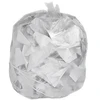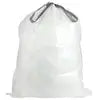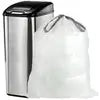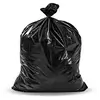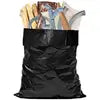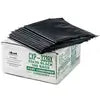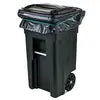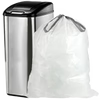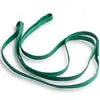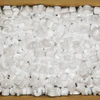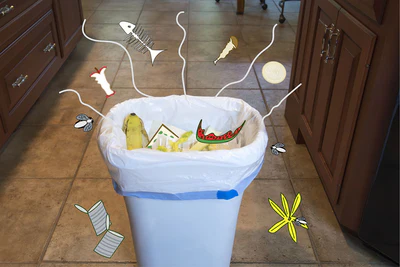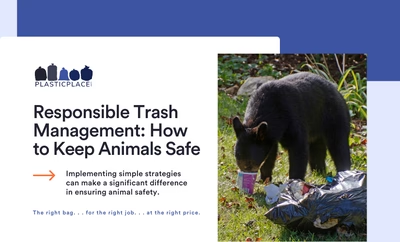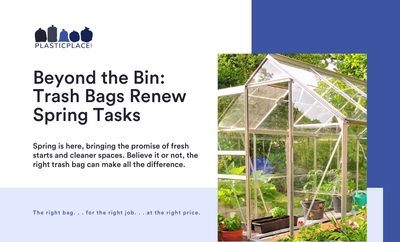Source: Cozine/Shutterstock.com
Are you finally getting around to cleaning out your basement? It’s about time. That old Parcheesi game is missing pieces and you’re never going to get around to learning how to use that tennis racket.
And now you’ve opened a forgotten box of old magazines. Birdwatching. Popular Mechanics. Knitting. Don’t throw your old magazines in drawstring trash bags just yet. We don’t know if you have what it takes to stick with a new hobby, but we do know you can recycle old magazines.
Buy Your Simplehuman Garbage Bags Here
Magazines Use Glossy Paper
That glossy paper on which your favorite celebrity gossip is printed looks deceiving. Shiny as it is, you may wonder if it’s plastic or some other material that would make the paper non-recyclable. Actually, that high gloss effect is achieved with clay and is perfectly recyclable.
Every once in a while you may come across a magazine with paper that is coated with plastic. When that happens, the plastic-coated magazine cannot be recycled.
Luckily, there’s an easy way to tell if your magazine’s high-gloss paper is printed using plastic or clay. Simply try to tear a page out of the magazine. If the page rips, it’s made with clay. If not, it’s likely plastic.
Benefits of Recycling Magazines
The rise of digital media hasn’t put print magazines out of circulation. Actually, despite the convenience of digital magazines, most readers prefer the print version. With almost 7,500 magazine titles available and millions of readers, that’s a lot of magazines destined for the blue bin or the landfill.
The EPA groups magazines under the broader heading of paper and paperboard waste. And of that type of waste, about 43 percent gets recycled. Even so, that means over 17 million tons of paper material was sent to landfills.
Recycling paper, including magazines, benefits the environment in several ways. Recycling two tons of paper saves enough energy to power a home for a year and saves about 14,000 gallons of water. Recycling paper also saves oil and reduces greenhouse gasses.
Buy Your Black Garbage Bags Here

Source: one photo/Shutterstock.com
How to Recycle Old Magazines
When you recycle your old magazines, you don’t have to do anything special to the magazine. It can go in the blue bin with staples intact. You can even leave the little perfume-scented cards on the inside of the magazines.
When to Toss Old Magazines
Not all old magazines can go in the recycling bin, even if they are printed on clay-coated paper. Stained magazines should go to the landfill instead of the recycling center. If you’ve used your old magazines to protect your floor while painting or to line the bottom of the cat litter, toss it in the garbage.

Source: M. Photos/Shutterstock.com
Other Uses for Old Magazines
Recycling is always preferable to sending an item to a landfill. But reusing your magazines around the house is usually even more sustainable. This is especially true if you use old magazines to make something you would otherwise purchase, such as a gift bag.
- Donate your old magazines. Schools may want your magazines for craft projects. Check with your library or local retirement community to see if they could use your old magazines.
- Compost your old magazines. Just like newspapers and cardboard, your magazine printed on clay-coated paper is compostable. Shred the paper first to help it compost more quickly.
- Make a craft project. There are hundreds of craft ideas using old magazines. Try these coiled magazine page coasters for an eclectic yet practical craft. Or use rolled magazine pages to make a one-of-a-kind piece of art. Skip the store-bought wrapping by making a gift bag out of your old magazines.
Practice the Three Rs
Make your magazine habit more sustainable by practicing the three Rs: reduce, reuse and recycle.
Reduce the number of magazines you consume by using your local library or online articles as much as possible. Before you purchase an e-book reader, assess your overall reading habits to make sure the device is your greenest choice. Try to always reuse magazines or donate them to an organization.
Finally, once you’ve exhausted your options for reducing and reusing magazines, toss them in the blue bin and be confident they’ll have new life. Up your green game by when you use environmentally friendly bags from Plasticplace.com.
 4.9 out of 5
4.9 out of 5  Mix & Match: Buy any two products for 10% off!
Mix & Match: Buy any two products for 10% off!











